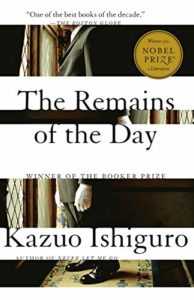Shhh!
I’d written my review of The Remains of the Day by Kazuo Ishiguro, about unreliable narrators, and it was quite tidy — our narrator Mr. Stevens would have been quite impressed — and that was the problem. It was too tidy, just like Stevens is for six-sevenths of the book. Then I reread the seventh and final chapter three times. And I saw what was missing: there’s a time gap.
The chapters are organized around Stevens’ journey from Darlington Hall where, for decades, he has been employed as butler. He takes a trip to visit former housekeeper, Miss Kenton (now Mrs. Benn), in the West Country. The penultimate chapter is titled “Day Four-Afternoon / Little Compton, Cornwall.” The final chapter fast-forwards two entire days, to “Day Six-Evening / Weymouth.” Stevens, our unreliable narrator, opens the final chapter by saying, “It is now fully two days since my meeting with Miss Kenton in the tea lounge of the Rose Garden Hotel in Little Compton.” That means day 5 is missing.
It’s not a mistake: It is a deliberate omission.
What happens on day 5? What does Stevens do with himself, besides drive between Little Compton and Weymouth? He doesn’t tell us. The author, Ishiguro, doesn’t tell us. It remains a secret.
The actual events of “Day 6-evening,” which close the book, involve a conversation Stevens has with a stranger, a man who also served as a butler before World War 2. He tells Stevens something he’s never considered — that most people consider the evening the best part of the day. He is the first person to whom Stevens opens his heart, with whom he has his first honest conversation of the entire book. What happened on day 5 to get him to that bench, enjoying the glory of the evening’s multicolored lights over the pier? We will never know. There is a curtain drawn across this gap.
In music, rests are significant. When a person pauses while giving a speech, it’s for emphasis. Poet Li-Young Lee, who wrote Peaches, which I learned By Heart, talks about the value of silence in a poem. Ishiguro gives us silence in this story, but unless we pay attention, we miss it.
Ishiguro keeps another secret from us, earlier in the book, back at Darlington Hall, when Miss Kenton catches Mr. Stevens reading a book. She asks him what he’s reading, and he won’t tell her. “Is it racy?” she asks. Stevens won’t say but clutches the book to his chest to hide the title. She pries away his fingers, just as Stevens pries away the fingers of his father from his work when he begins to fail in his duties as an underbutler. The book is revealed to be “a sentimental old love story.” But what love story? Ishiguro keeps the secret.
Kazuo Ishiguro won the Booker prize for this novel in 1989 and won the Nobel for literature in 2017. He was born in Nagasaki, two years before this book is set. He recalls that the Japan he remembers had cleaned up all evidence of the devastation caused by the atomic bomb, and no one talked about it. At the age of five he moved with his parents to England and still lives there. His favorite author is Charlotte Brontë. He’s convinced he stole some ideas of how narrators deceive themselves from Jane Eyre.
Ishiguro is silent about that sentimental book and about that day 5, but we see the turn Stevens makes in his meeting with Miss Kenton and the further turn he makes in his conversation with the other butler. It seems he took time to think about what he did and to let it inform what he will do for the remains of his day and of his life.
What have you done with the silences in your life? What secrets hidden behind a veil would tell us how you came to be who you are? You may or may not need to reveal your day 5. Let us instead see what you plan to do with the evening of your one wild and precious life.
Your Turn
1. Have you read a book in which the author kept a secret from readers?
2. I was so frustrated with Stevens’ unreliable narration that I paused after chapter 1 and watched the movie. After that I was able to dig in. Because I worked hard with this book, it’s more special to me. Have you wrestled through a book and been glad for having done so?
3. Share your February pages. Sliced, started, and abandoned are all fair game.
February’s Pages
Poetry
Winter Morning Walks: one hundred postcards to Jim Harrison, by Ted Kooser and as many poems by Jim Harrison as I could easily find
Picture Books and Early Readers
Uncommon Traveler: Mary Kingsley in Africa, by Don Brown
The Elephant’s Child, by Rudyard Kipling, illus. John A. Rowe
Yum! ¡MmMm! ¡Qué rico! America’s Sproutings, haiku by Pat Mora, illus. Rafael López
Middle Grade and YA
Homesick: My Own Story, by Jean Fritz, illus. Margot Tomes (Join us for Children’s Book club next Friday!)
The Box of Delights, by John Masefield alternate title, When the Wolves Were Running, mentioned in Katherine May’s Wintering
Hatchet, by Gary Paulsen
Grownups
The Divine Comedy, by Dante Aligheri, trans. Henry Wadsworth Longfellow (finished “Paradiso”)
Bloodlines & Fencelines, by D.L.S. Evatt (mystery)
The Remains of the Day, by Kazuo Ishiguro
Photo by cattan2011, Creative Commons, via Flickr. Post by Megan Willome.
Browse more book reviews with Perspective
I loved this book. As soon as I finished, I began reading it again.”
—David Lee Garrison, author of Playing Bach in the D. C. Metro
- Perspective: The Two, The Only: Calvin and Hobbes - December 16, 2022
- Children’s Book Club: A Very Haunted Christmas - December 9, 2022
- By Heart: ‘The night is darkening round me’ by Emily Brontë - December 2, 2022



Glynn says
The entire mystery genre is built upon the idea of the author keeping a secret from the reader, at least until the end, dropping only subtle cluses. The mystery that caused outrage because of what the secret was “The Murder of Roger Ackroyd” by Agatha Christie, published in 1926. I didn’t know about the outrage when I first read it, but it remains my favorite Christie mystery.
February reading:
Fiction
Mouth to Mouth by Antoine Wilson
Nathan Coulter by Wendell Berry
This Much Huxley Knows by Gail Aldwin
Passage to Inis Mor by Brian O’Raleigh
Non-fiction
Bad News: How Woke Media is Undermining Democracy by Batya Ungar-Sargon
Terms of Service: The Real Cost of Social Media by Chris Martin
The Turning Point: A Year That Changed Dickens and the World by Robert Douglas-Fairhurst
The Confederate Surrender at Greensboro by Robert Dunkerly
Mystery
The Final Shot by Simon Michael
Murder in the Mine by Roy Lewis
Closer to the Dead by Scott Hunter
Deadly Still by Keith Moray
Poetry
They Grow in Groves by Thomas Colquith
Come Looking by River Dixon
The Book of Celtic Verse, edited by John Matthews
The Joseph Tree by Isabel Chenot
Megan Willome says
Well, that’s enough reason for me to add “The Murder of Roger Ackroyd” to my list. It’s been recommended by several people, so you are not alone in your enthusiasm.
Bethany R. says
Fascinating analysis. Thank you for this, Megan.
Megan Willome says
Thanks, Bethany. Have you ever read a book in which the author kept secrets and didn’t reveal them?